

Global international migration flows. It's time to restate the business case for migration. Last Friday, America's President Trump issued an Executive Order, temporarily banning the entry of Syrian refugees, suspending the entire US refugee admission programme for 120 days, significantly reducing the number of refugees to be resettled in the US this year, and stemming all migration to the US from Iran, Iraq, Libya, Somalia, Sudan, Syria and Yemen for 90 days.
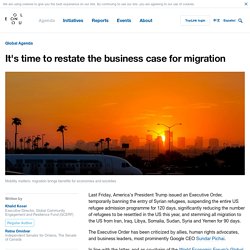
The Executive Order has been criticized by allies, human rights advocates, and business leaders, most prominently Google CEO Sundar Pichai. In line with the latter, and as co-chairs of the World Economic Forum’s Global Future Council on Migration, we are especially surprised that such an order would emanate from a former businessman. Far from putting America first, limiting migration, and broadcasting an anti-immigration stance, risks a lasting impact that may jeopardize US employment, economic growth, and innovation. First, there is clear evidence that migration promotes economic growth. Share Written by. The European Union to prevent a wave of migrants from Libya.
ALTHOUGH he was not there, it was hard to escape Donald Trump at the European Union’s latest summit.
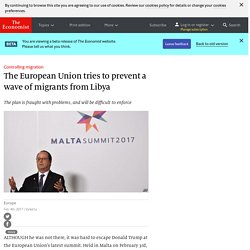
Held in Malta on February 3rd, the day-long event focused on new plans for handling migration, particularly for stemming the flow of people making their way towards Europe from sub-Saharan Africa through Libya and across the Mediterranean. It also touched upon broader (and slightly wonky) questions of what the EU means 60 years on from the Rome treaty. But it was Mr Trump who dominated proceedings. François Hollande, the French president, called his American counterpart’s comments earlier this month denigrating the EU “unacceptable”. Describing the new migration plans, Federica Mogherini, the union’s foreign policy chief, said “we do not believe in bans and walls”, a slap at Mr Trump’s executive order on refugees and his plans for a wall on America’s Mexican border. Where do immigrants in the United States come from? - An AJLabs production. The dream of a better life - why refugees move on from Turkey and Greece. The European Commission has decided to start returning migrants from other European countries back to Greece, lifting a ban on the practice that was put in place in 2011.
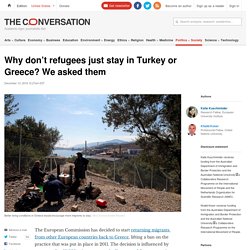
The decision is influenced by concerns that 13,000 migrants recently disappeared from camps in Northern Greece and may have migrated onwards into Northern Europe. European leaders also want Greece to start returning migrants to Turkey under the EU-Turkey agreement. As the current migration and refugee crisis has unfolded, one question has frequently been asked: why don’t refugees just stay in Turkey or Greece? Because migration research tends to focus on why people leave their home countries in the first place, we often miss the critical in-between step. Indeed, migrants may try to establish a life in an intended destination country, such as Turkey or Greece, but then be compelled for different reasons to move on. Why refugees want to leave. The Photos Syrian Refugees Carried.
Heading into war—in Tim O’Brien’s Vietnam War novel The Things They Carried—soldiers packed letters, bibles, and soap.

Coming out of war—in photographer Muhammed Muheisen’s series “Memories from Syria”—refugees clutched photographs. In refugee camps across Greece, Muheisen, the Associated Press chief photographer for the Middle East, asked Syrians to see the photographs they took on their thousand-mile journey. Rohingya refugees may be sent to remote island Thengar Char. The official did not want to be named because he fears reprisals.
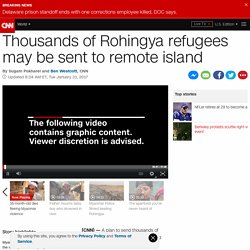
The refugees are currently living in Bangladeshi camps, but under a new government directive they may be moved to Thengar Char Island. It's about 30,000 hectares in size, more than 37 miles from the mainland, officially uninhabited and mostly flooded during heavy rain or monsoon season, District Forest Officer Amir Hossain Chowdhury told CNN. The small African region with more refugees than all of Europe. As Ali Kawu eases his handcart to a halt on a recent morning in north-east Nigeria, it is the first time he has dared to stop walking in more than 24 hours.
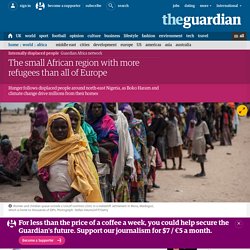
A day earlier, at 8am, Boko Haram militants raided his village. Kawu, 25, escaped with what he could – his wife, their three children, and kindling for a fire. They left behind their papers, six sacks of beans, up to 15 dead neighbours, and 10 kidnapped villagers. Then they walked all day and all night. “Every minute I would look back to see if they were following us,” Kawu says, shortly after reaching the safety of Monguno, a town recaptured from Boko Haram last year. But safety doesn’t mean comfort. Beyond the headlines: quantifying the economic contributions of migrants.
In today’s society, we are defined by our ability to reach every corner of the world in an instant.
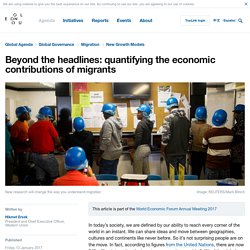
We can share ideas and move between geographies, cultures and continents like never before. So it’s not surprising people are on the move. In fact, according to figures from the United Nations, there are now 243 million international migrants, representing roughly 3.4% of the global population. Migration is a major dimension of globalization, but today we live in a time of huge political and economic uncertainty – one where many countries are questioning their national identities and their status within the international community. As such, migration and migrant matters have become some of the most talked-about topics of today’s political and media discourse, with the dominant narratives focusing either on remittance flows by migrants to relatives in their home countries or friction within their host country. Mediterranean Refugees (March 2016 Update) - Views of the World. This year’s New Teacher Subject Day organised by the Prince’s Teaching Institute took place at Altrincham Grammar School for Girls near Manchester.
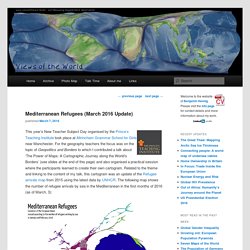
For the geography teachers the focus was on the topic of Geopolitics and Borders to which I contributed a talk about ‘The Power of Maps: A Cartographic Journey along the World’s Borders’ (see slides at the end of this page) and also organised a practical session where the participants learned to create their own cartogram. Related to the theme and linking to the content of my talk, this cartogram was an update of the Refugee arrivals map from 2015 using the latest data by UNHCR. The following map shows the number of refugee arrivals by sea in the Mediterranean in the first months of 2016 (as of March, 3): (click for larger version) Is freedom of movement a human right? Western Sahara: Forty years in a refugee camp. Thousands of migrants journeying through Latin America. "A lot of roads, lots of bus rides, and a lot of walking too," she tells CNN, agreeing to be interviewed but asking that we only use her first name and not show her face.
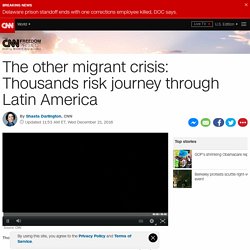
"For a 7-month pregnant woman, that is a long, long time. " Yolanda says she is originally from Congo. She and her husband are among tens of thousands of migrants -- many from Africa and Haiti -- criss-crossing South and Central America trying to reach the United States. African ghosts in Sicily. Political and social instability, economic deprivation and conflict have forced thousands of people to flee their homelands in sub-Saharan Africa, their hopes for a better life far outweighing any fear of the long and dangerous journey to Europe.
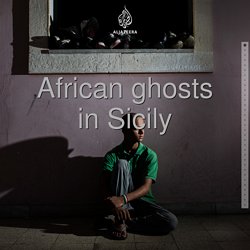
They risk it all - crossing deserts, enduring brutality in the prisons of Libya and embarking on perilous voyages across the Mediterranean on rafts and old fishing boats. Inside the Harrowing Journeys of Refugee Mothers. When you hear “refugee crisis,” you might envision photos of small boats afloat on dark waters and packed with people wearing neon-orange life vests. You might think of hands reaching for loved ones across fences, of borders being guarded by men with machine guns, of makeshift tent settlements teeming with homeless families. Migrant crisis: Greece refugee camps hit by winter. Migrants sent half a trillion dollars home last year. These maps show where the money went. Lost at sea: The search for missing refugees. The last time Gholam saw his wife and two children was in the brief moment before a high wave split their boat in half and catapulted the dozens of people on board towards the sea.
In the chaos of October 16, 2015, Gholam, an Afghan refugee from Kabul, held his eldest son's head above water so that he could breathe. But overcome by rough winds and unable to see in the darkness, he could not find his wife, their four-year-old son or their nine-year-old daughter. More than a year later, he still recalls desperately hanging on to a piece of wreckage as the shards of wood dug into his palms and feet.
Gholam, his son and others were eventually rescued when a large ship crossed their path and transferred them to the Turkish coastguard. These 10 conflicts have forced 65 million people to flee their homes. The number of people displaced by war and conflict is now equal to the entire population of the United Kingdom. UK government report slams migration 'failures' A report sanctioned by the British government has said that the country has failed to keep up with the changes brought by immigration. Dame Louise Casey published her findings on Monday more than a year after the report was commissioned by the former Prime Minister David Cameron.
The report raised concerns about the economic and social plight of many ethnic minorities living in Britain, but also strongly criticised cultural attitudes within those communities, specifically among Muslims. Casey said "Cultural and religious practices" were holding many women within those communities back from making progress. Speaking to BBC Radio 4 on Monday morning, Casey, a former government official, blamed, the "misogyny and patriarchy" of some men in Muslim communities for leaving women socially and economically isolated.
She said such practices ran "contrary to British values", and sometimes broke the country's laws. "As former Prime Minister David Cameron has stated, "integration is a two-way street". Europe's refugee and migrant crisis in 2016. In numbers. Facts and figures about the refugee crisis that brought 1 million refugees and migrants to Europe last year. Nearly 1 in 100 people worldwide have been displaced from their homes by war and persecution. There are more than 65 million people displaced from their homes, a record high since World War II. Eritrean refugees in Israel sent to Uganda and Rwanda - News from Al Jazeera. Displaced refugees fear more loss as Lake Chad shrinks. A total of 2.4 million people in northeastern Nigeria, Cameroon, Chad and Niger have been displaced by the rise of Boko Haram. Dadaab: Could Kenya close world's largest refugee camp?
The biggest issues facing migrants today - and what we can do to solve them. Thousands of refugees forced from camp in Paris - News from Al Jazeera. Paris authorities began an operation early on Friday to clear more than 3,000 people from a makeshift refugee camp in the northeast of the French capital. These two maps will change how you think about the journeys of migrants and refugees. Paris Is the New Calais, With Scores of Migrants Arriving Daily. As many as 3,000 are camped here, according to aid groups. US election 2016: Life on the US-Mexico border. Migrants are good for advanced economies, says the IMF. This animated video shows 125,000 years of human migration. DNA tests on almost 1,000 people have shown all non-Africans are related to a single population that migrated from Africa between 80,000 and 50,000 years ago. UNHCR: Bulgaria should improve integration of refugees. The last days of the Calais ‘Jungle’
‘People in the Jungle don’t want this “solution”. This isn’t freedom! Making profit out of hope. Europe: united against refugees. Survey finds 70% of migrants arriving in Europe by boat trafficked or exploited. Children of the Calais 'Jungle' trying to reach the UK. Families speak of their joy at being reunited with Calais children. Why you're probably wrong about levels of immigration in your country.
Boston's newest art installation takes on world refugee crisis. Syrian refugees praised for seizing fugitive in Germany - News from Al Jazeera. Ten countries host half of world's refugees: report - News from Al Jazeera. Refugees stranded in Somalia after Kenya eviction - News from Al Jazeera. Interactive: The refugee crisis beyond Europe - News from Al Jazeera.
Is Libya the answer to the refugee crisis in Europe? Boko Haram refugees in Niger find safety, but lack aid - News from Al Jazeera. Journey Into the Unknown. Educate refugee children or lose them forever. Jordan's Sudanese Refugees: 'We are tired' - News from Al Jazeera. The child refugee crisis has reached a new low – we must act now. 4 maps that will change how you see migration in Europe. Refugee camps last for decades – it's time to make their infrastructure permanent. What 50 million kids looks like. Passage through Mexico: the global migration to the US. Rescuing refugees: 'You never get used to it – and that's a good thing' In the long crossing to Hungary refugee families get stuck in transition. Desperate journeys: 3,034 refugees die in seven months - News from Al Jazeera. Symbols of hope: Refugees at the Olympics. Jordan unlikely to open its doors to more refugees.
See Captivating Photos of Refugees in a Converted School. Haitian quake survivors welcomed in Brazil's Amazon - News from Al Jazeera. Can Obama Pardon Millions of Immigrants? Correcting media myths about refugees and migrants. Migrants stranded in Colombia as route to US closed - News from Al Jazeera. I trekked across Europe so I could go to school safely.